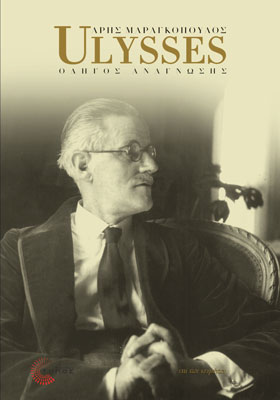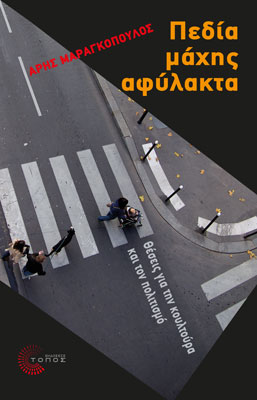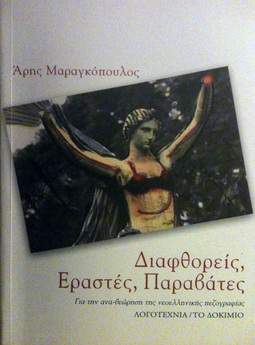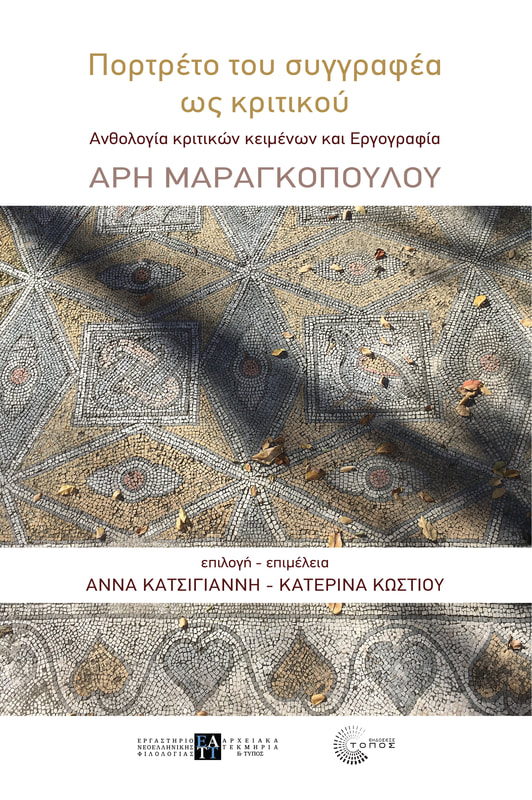Ulysses, a Reader's Guide …and more
(1st ed.: 1995, 2nd.: 2001, 3rd.: 2010)
(1st ed.: 1995, 2nd.: 2001, 3rd.: 2010)
 "Ulysses", a Reader's Guide, 3rd ed. cover
"Ulysses", a Reader's Guide, 3rd ed. cover
There is no twentieth century reader who can claim never to have read Ulysses, even if only indirectly; for few writers of the century just past have escaped being influenced by this book. Ulysses has indeed become one of the mythical works of world literature –more so to those who have not read it than to those who have had the chance to enjoy from beginning to end its several hundred pages of dense and obscure writing.
There is perhaps no other book in the world literature which gives rise to such hopeless frustration in its would-be reader, from the very first chapter, the very first lines even, yet which, at the same time, continues to sell more than a hundred thousand copies annually. What is interesting is that even today, almost eighty years after the first edition of the book was published, when modernism of all kinds has infiltrated permanently into the collective unconscious of the serious reader, Joyce’s “egotistical” modernism still seems to present an obstacle to our free navigation of Ulysses.
So much has been written about this book that many people paradoxically feel obliged to embark on the process of reading it as a result of social pressure: in order not to appear ill-informed and uneducated. This kind of cultural activism, widespread in the metropolis of the Western world, invariably ends in disenchantment: such readers not only fail to “understand” the book but also, more importantly, miss out on the unlimited pleasure it offers to those who approach it in a different, “open-minded” spirit.
An important priority of our essay 'Ulysses', a Reader's Guide, was thus to provide a guide to reading the Joycean text in a way which serves to liberate the channels of enjoyment from any such obstacles…*
* Excerpt from A.M.'s «Introduction chapter» in Ulysses, a Reader's Guide.
There is perhaps no other book in the world literature which gives rise to such hopeless frustration in its would-be reader, from the very first chapter, the very first lines even, yet which, at the same time, continues to sell more than a hundred thousand copies annually. What is interesting is that even today, almost eighty years after the first edition of the book was published, when modernism of all kinds has infiltrated permanently into the collective unconscious of the serious reader, Joyce’s “egotistical” modernism still seems to present an obstacle to our free navigation of Ulysses.
So much has been written about this book that many people paradoxically feel obliged to embark on the process of reading it as a result of social pressure: in order not to appear ill-informed and uneducated. This kind of cultural activism, widespread in the metropolis of the Western world, invariably ends in disenchantment: such readers not only fail to “understand” the book but also, more importantly, miss out on the unlimited pleasure it offers to those who approach it in a different, “open-minded” spirit.
An important priority of our essay 'Ulysses', a Reader's Guide, was thus to provide a guide to reading the Joycean text in a way which serves to liberate the channels of enjoyment from any such obstacles…*
* Excerpt from A.M.'s «Introduction chapter» in Ulysses, a Reader's Guide.
Read extensively about A.M.'s study on Joyces' Ulysses
and about his other studies
on James Joyce here.
and about his other studies
on James Joyce here.
Portrait of the Writer as a literary Critic
2020
2020
|
The Portrait of the Writer as a literary Critic, is an anthology of literary reviews, essays and theses on culture selected out of a larger corpus of forty years literary work published in national newspapers, magazines or delivered as public lectures on various occasions. My starting point is the belief that the dominant literary critique in Greece has not succeeded to read the most important of its authors through a bold critical eye. It has preferred instead to hoard them indiscriminately and indifferently at the “museum” of national literary pride. For example, the legacy of the pro-modernist writers (end of 19th, beginnings of 20th century), like Viziinos, Papadiamantis, Roides, Mitsakis, to mention only the greatest of them –who are less known outside the narrow limits of the Greek speaking world, yet they are comparable to the great European masters of the same period– undoubtly deserves to be read and critically reviewed in the same demanding framework as that of Henry James, Virginia Woolf, Stéphane Mallarmé, Anton Tchekov etc. These writers, to say the least, represent an original example of modernism in a period when the first relevant experiments were just taking place in other parts of Europe.
So, that is one thing this book achieves: it re-maps the critical reading of the Greek literary tradition in the perspective of the European literary canon. By doing so it also achieves something equally important: since the mainstream critique has thus far limited its readings to the plot, the story, the period, the history of literature, its reviews have always remained tragically subjective, chauvinist, peripheral, stubbornly underestimating the originality of the above narratives. Well, my essays of these forty years constitute an attempt to re-read these original texts with a fresh eye without the myopic lenses of historism and critical impressionism, thus constituting an exemple of “scientific” critique. In the same book are also included a number of theoretical essays examining various cultural phenomena that have shaped / influenced dramatically the mentality of the post war generations of Greek people. |
Unguarded Battlefields
a thesis on culture and civilisation, 2014
a thesis on culture and civilisation, 2014
 "Unguarded Battlefields", the cover
"Unguarded Battlefields", the cover
This is an essay on contemporary Greece, focusing on its culture before and after the financial crisis. The author examines the local mentality of "fast food, fast read, fast fuck", as an immediate consequence of the globalised model of the ''rich and beautiful'' (which through the dominant anglo-Saxon media hegemonism has succeeded over the last two decades to be transplanted into the contemporary everyday mentality and lifestyle).
In the same context the role of the Internet is examined thoroughly ("The work of art at the age of its digital reproduction"): the author considers it as an immense illusion of "freedom and democracy"; in fact, he maintains, it is nothing more than a factory-playground where all possible users play and offer free of charge their work and time. Some other issues discussed extensively in this much discussed book are: the role of the Future Library Programme promoted worldwide by Google, as well as other ways through which globalised culture has a direct political impact on every single aspect of contemporary life.
In the same context the role of the Internet is examined thoroughly ("The work of art at the age of its digital reproduction"): the author considers it as an immense illusion of "freedom and democracy"; in fact, he maintains, it is nothing more than a factory-playground where all possible users play and offer free of charge their work and time. Some other issues discussed extensively in this much discussed book are: the role of the Future Library Programme promoted worldwide by Google, as well as other ways through which globalised culture has a direct political impact on every single aspect of contemporary life.
Seducers, Lovers, Transgressors
a re-reading of modern Greek literature, 2005
a re-reading of modern Greek literature, 2005
 "Seducers, Lovers, Transgressors" the cover
"Seducers, Lovers, Transgressors" the cover
After years and years of reviewing art and books and after the long experience of working on Joyce A.M. decided he had something to say on the Greek literary scene, more precisely on modern Greek literature and its reception by conservative academic mediators – who had never been helpful to understand the old masters of the end of 19th and the beginnings of 20th century, nor inspired him to follow their example.
In this book his main endeavour has been to re-read the Greek masters and make others read them afresh. He tried to understand, at first for his own sake, the tradition of pro-modernist writers of the end of 19th century and the beginnings of 20th, writers little known outside the narrow limits of the Greek language but comparable to the great European masters of the same period. Because Viziinos, Papadiamantis, Roides, Mitsakis, to mention only the greatest Greek authors of prose, undoubtly merit a place of honour next to Henry James, Virginia Woolf, Anton Tchekov, and others of their quality. And, moreover, they represent a very daring example of modernism in a period when the first relevant experiments were just taking place in Europe.
Unfortunately the dominant critique in Greece in the whole 20th century did not succeed to read these authors in a substantial way. The critics have limited their reading in the plots, the stories, the period, the history. Their reviews have always remained subjective, chauvinist, peripheral, miserable, stubbornly underestimating the originality of the texts. They never enjoyed, they never rejoiced, they never felt enthusiasm and at the same time due respect to the accomplishment of these masters. They never understood them and for this reason they never managed to get them translated so that Europe might get to know their work. A.M.'s essay, explains in full this conservative reception, this historical blunder, reads the original texts in a fresh eye, underlines the modernist elements in the works, stresses the importance of this literary legacy, documents in length its reasoning.
In this book his main endeavour has been to re-read the Greek masters and make others read them afresh. He tried to understand, at first for his own sake, the tradition of pro-modernist writers of the end of 19th century and the beginnings of 20th, writers little known outside the narrow limits of the Greek language but comparable to the great European masters of the same period. Because Viziinos, Papadiamantis, Roides, Mitsakis, to mention only the greatest Greek authors of prose, undoubtly merit a place of honour next to Henry James, Virginia Woolf, Anton Tchekov, and others of their quality. And, moreover, they represent a very daring example of modernism in a period when the first relevant experiments were just taking place in Europe.
Unfortunately the dominant critique in Greece in the whole 20th century did not succeed to read these authors in a substantial way. The critics have limited their reading in the plots, the stories, the period, the history. Their reviews have always remained subjective, chauvinist, peripheral, miserable, stubbornly underestimating the originality of the texts. They never enjoyed, they never rejoiced, they never felt enthusiasm and at the same time due respect to the accomplishment of these masters. They never understood them and for this reason they never managed to get them translated so that Europe might get to know their work. A.M.'s essay, explains in full this conservative reception, this historical blunder, reads the original texts in a fresh eye, underlines the modernist elements in the works, stresses the importance of this literary legacy, documents in length its reasoning.

